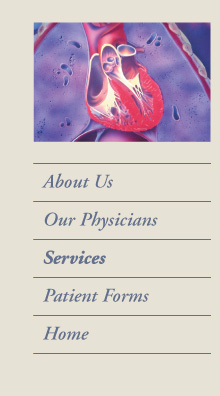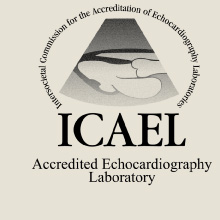Our Outpatient Diagnostic Services
During the course of your medical care, you may require certain diagnostic tests at the discretion of your physician. These are performed mostly in our office with state-of-the-art equipment. These diagnostic tests include:
- ELECTROCARDIOGRAM (ECG) - The ECG (also known as an EKG) provides information regarding the electrical activity of the heart, as well as other cardiac abnormalities such as heart attacks. These are often necessary for diagnosis and for follow-up.
- ECHOCARDIOGRAPHY
Our modern, accredited echocardiography lab performs noninvasive ultrasound testing with two-dimensional, M-mode, Doppler, and color flow imaging to assess heart size and function, valve function, physiological information (blood flow velocities, gradients and pressures) and other disorders such as congenital defects.
- STRESS TEST
Stress testing is helpful in the evaluation and follow-up of coronary artery disease, chest pain and other symptoms. The patient walks on a treadmill, with frequent monitoring of the heart rhythm and blood pressure, as the treadmill gradually increases in speed and incline. Depending on the situation, the cardiologist may recommend a stress test with imaging to obtain additional information about the heart.
- NUCLEAR CARDIOLOGY

Our state-of-the-art, accredited nuclear laboratory performs several types of cardiovascular diagnostic tests. With the use of high-tech computers, we can analyze relative blood flow and global function of the heart muscle. Nuclear cardiac tests may be used in conjunction with treadmill stress tests. For patients who have difficulty on a treadmill, a pharmacological stress test using adenosine, dobutamine or dipyridamole can take the place of the treadmill. In our experience, the use of these FDA-approved medications is generally well tolerated.
- PACEMAKER/DEFIBRILLATOR CLINIC
There are several tests that can be performed to evaluate a pacemaker or defibrillator. Some of the routine checks are done by telephone transmission from the patient's home. Periodically, the patient will need to come to the office for a more complete but noninvasive, computerized assessment or reprogramming of the device.
- HOLTER MONITOR - A Holter monitor is a portable 24-hour tape recording of your heartbeat used to detect erratic heart rhythms, or to assess the effectiveness of treatment for abnormal heart rhythms.
- EVENT RECORDER
An event recorder is a patient-activated heart rhythm recorder used for an extended period of time. It can be helpful in the evaluation of sporadic cardiac symptoms.
- VASCULAR ULTRASOUND
Vascular ultrasound uses Doppler and B-mode imaging of specific arteries and veins to check for impairment to blood flow in a noninvasive manner. Ultrasound of the veins, for instance, can reveal blood clots that treatment with blood thinners and/or follow-up ultrasounds. Ultrasound of the carotid arteries can identify clogging in the neck arteries that might produce a stroke or mini-stroke.
Our In-Hospital Diagnostic Services
Occasionally, your medical and care may require certain additional procedures at the hospital. These procedures include:
- CARDIAC CATHETERIZATION
Cardiac catheterization (sometimes called an angiogram) is a specialized test useful in the evaluation of heart disease. This test provides information about the presence or absence of clogged arteries, as well as the specific location and severity of blockages. Cardiac catheterization can also help determine cardiac pressures, as well as the function of heart muscle, valves and other cardiac structures.
- TRANSESOPHAGEAL ECHO (TEE) - This type of echocardiogram is performed under mild intravenous sedation by inserting a small flexible tube with an ultrasound transducer into the esophagus, similar to an endoscopy. This 15-20 minute examination provides detailed information on different heart structures.
|








